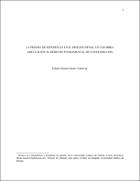Please use this identifier to cite or link to this item:
https://repositorio.uco.edu.co/jspui/handle/20.500.13064/761Full metadata record
| DC Field | Value | Language |
|---|---|---|
| dc.rights.license | http://creativecommons.org/licenses/by/3.0/ | - |
| dc.contributor.advisor | Arcila-Salazar, Beatriz Helena | spa |
| dc.contributor.author | Osorio-Valencia, Fabian Alonso | spa |
| dc.coverage.spatial | Sudamérica, Colombia, Rionegro, Antioquia | es_ES |
| dc.date | 2020-05-22 | - |
| dc.date.accessioned | 2021-03-05T21:51:45Z | - |
| dc.date.available | 2021-03-05T21:51:45Z | - |
| dc.date.issued | 2021-03-05 | - |
| dc.identifier.uri | https://repositorio.uco.edu.co/handle/20.500.13064/761 | |
| dc.description.abstract | La Corte Constitucional ha señalado que el derecho a la prueba constituye uno de los principales ingredientes del debido proceso, así como del derecho al acceso a la administración de justicia y el más importante vehículo para alcanzar la verdad en una investigación judicial (Corte Constitucional, Sentencia T – 078 de 2010). En materia penal existen diferentes medios de conocimiento, para que el juez fundamente su decisión, pero la llamada prueba de referencia tiene reglas, con lo cual es posible que se limite una importante garantía fundamental, el principio de contradicción. De ahí surge la excepción al principio de oralidad de las actuaciones, pues la prueba de referencia en muchos casos no se produce en juicio sino que se introduce al mismo. Desde esa perspectiva, el presente trabajo se propone, analizar la prueba de referencia y su admisión al interior del proceso penal, así como el impacto al derecho fundamental de la contradicción. La Corte Suprema de Justicia a través de los años ha creado una línea en la cual limita la prueba de referencia, pero se planteará que los fallos no deben estar por encima de los derechos fundamentales de las personas, en tal medida es preciso entonces aludir que la Corporación siendo respetuosa de estos principios aplica la prohibición prevista en el inciso 2° del artículo 381 de la ley 906 de 2004. | es_ES |
| dc.format.extent | 28 | es_ES |
| dc.format.mimetype | application/pdf | es_ES |
| dc.language.iso | spa | es_ES |
| dc.rights | info:eu-repo/semantics/openAccess | spa |
| dc.rights.uri | http://creativecommons.org/licenses/by-nc-nd/2.5/co/ | * |
| dc.subject | Prueba | es_ES |
| dc.subject | Prueba de referencia | es_ES |
| dc.subject | Reglas de la sana crítica | es_ES |
| dc.subject | Juez | es_ES |
| dc.subject | Principio de contradicción | es_ES |
| dc.subject | Actuación procesal | es_ES |
| dc.title | La prueba de referencia en el proceso penal en Colombia -adecuación al derecho fundamental de contradicción- | es_ES |
| dc.type | Bachelor thesis | es_ES |
| dc.description.abstractenglish | The Constitutional Court has indicated that the right to proof constitutes one of the main ingredients of due process, just like the right of access to the administration of justice and the most important vehicle to reach the truth in a judicial investigation (Constitutional Court, Judgment T - 078 of 2010.) In criminal matters, there are different means of knowledge, so that the judge can base his decision, but the so-called benchmark test has rules, which may limit an important fundamental guarantee, the principle of contradiction. From there arises the exception to the principle of orality of the proceedings, since the benchmark test does not occur in court but is introduced to it. From this perspective, the present work sets out to analyze the benchmark test and its admission into the criminal process, as well as the impact of the contradiction on the fundamental right. The Supreme Court of Justice over the years has created a line in which it limits the benchmark test, but it will be argued that the rulings must not be above the fundamental rights of the people, to such an extent it is necessary then to allude that The Corporation, being respectful of these principles, applies the prohibition provided for in subsection 2 of article 381 of law 906 of 2004. | es_ES |
| dc.subject.subjectenglish | Evidence | es_ES |
| dc.subject.subjectenglish | Benchmark evidence | es_ES |
| dc.subject.subjectenglish | Rules of sound criticism | es_ES |
| dc.subject.subjectenglish | Judge | es_ES |
| dc.subject.subjectenglish | Principle of contradiction | es_ES |
| dc.subject.subjectenglish | Procedural action | es_ES |
| dc.subject.lemb | Política | es_ES |
| dc.subject.lemb | Sistemas jurídicos | es_ES |
| dc.subject.lemb | Aplicación de la ley | es_ES |
| dc.subject.lemb | Seguridad hunama | es_ES |
| dc.subject.lemb | Derechos humanos | es_ES |
| dc.subject.lemb | Sanción penal | es_ES |
| dc.subject.lemb | Reforma social | es_ES |
| dc.audience | Interés General | spa |
| dc.rights.accessrights | Open Access | spa |
| dc.rights.spa | Acceso abierto | spa |
| dc.rights.cc | Atribución-NoComercial-SinDerivadas 2.5 Colombia | * |
| dc.publisher.department | Derecho | es_ES |
| dc.publisher.program | Derecho | es_ES |
| dc.contributor.corpauthor | Universidad Católica de Oriente. Facultad de derecho | es_ES |
| dc.identifier.bibliographicCitation | Osorio Valencia, Fabian Alonso. La prueba de referencia en el proceso penal en Colombia -adecuación al derecho fundamental de contradicción- (Trabajo de grado) Rionegro, Antioquia: Universidad Católica de Oriente; 2020. 28p. | es_ES |
| Appears in Collections: | Derecho | |
Files in This Item:
| File | Description | Size | Format | |
|---|---|---|---|---|
| LA PRUEBA DE REFERENCIA EN EL PROCESO PENAL EN COLOMBIA, ADECUACION AL DER. FUNDAMENTAL DE CONTRADICCIÓN.pdf | 479.87 kB | Adobe PDF |  View/Open | |
| Consentimiento.pdf Until 2050-12-31 | 133.08 kB | Adobe PDF | View/Open Request a copy |
This item is licensed under a Creative Commons License

